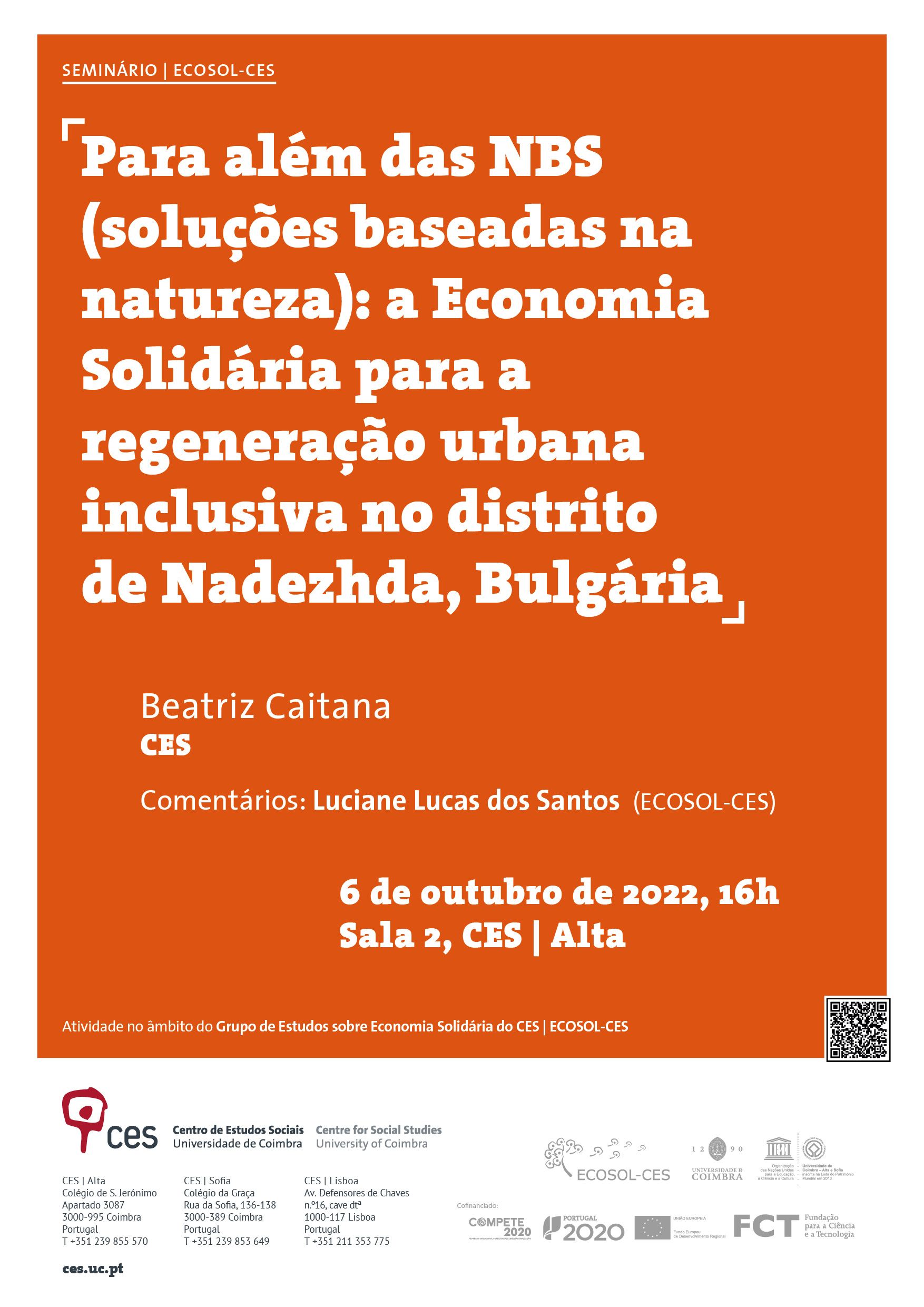Seminário | ECOSOL-CES
Economia Solidária e as soluções baseadas na natureza (NBS) como motores para a regeneração urbana inclusiva do distrito de Nadezhda, Bulgária
Beatriz Caitana (CES)
6 de outubro de 2022, 16h00
Sala 2, CES | Alta
Comentários: Luciane Lucas dos Santos (Ecosol-CES)
Apresentação
A regeneração de espaços urbanos públicos em áreas periféricas pelo projeto URBiNAT (em implementação), financiado no âmbito do programa Horizonte 2020 da União Europeia, fornece evidências empíricas para apoiar os argumentos de que a Economia Solidária (ES) contribui para a capacidade adaptativa socioeconómica das soluções baseadas na natureza (NBS ). Há, de fato, muitas oportunidades na relação entre a ES e a perspectiva de regeneração urbana inclusiva, sobretudo quando consideramos os bairros urbanos situados em um conjunto de relações culturais, socioeconômicas e emocionais complexas. Quatro aspectos principais demonstram que: (a) a ES está alicerçado na territorialidade e estimula a conexão com o espaço físico; (b) a interdependência entre a ES e a natureza é reforçada pela perspectiva mais justa e consciente de produção e consumo; (c) o questionamento às desigualdades econômicas nos territórios contribui para a promoção do acesso equitativo aos recursos, (d) a ES estimula novas formas de sociabilidade e conexão com a comunidade pautadas na gestão democrática das iniciativas. A componente da Economia Solidária na estratégia do Corredor Saudável de Sofia (enquanto cluster de NBS) no distrito de Nadezhda é marcada por várias práticas como o Repair Café, a Bread house e a rede de Farmers Markets. Nesta sessão será discutido a relação da ES com o corredor saudável e as práticas empregadas para reconfigurar o espaço público, constituindo mais do que uma “solução verde”.
Nota biográfica
Beatriz Caitana é socióloga e investigadora no âmbito do projeto URBiNAT no Centro de Estudos Sociais (CES) da Universidade de Coimbra (UC, Portugal). Atualmente é membro da coordenação científica do projeto H2020 URBiNAT, que se centra na regeneração urbana inclusiva de bairros de habitação social de 7 cidades europeias através da implementação de soluções baseadas na natureza no espaço público, como resultado de um processo de co-criação envolvendo municípios, stakeholders e população das áreas de intervenção. É membro permanente do grupo de estudos sobre Economia Solidária - Ecosol/CES. Colaborou no projeto PATHS - Juventude para a Economia Solidária e Empreendedorismo na Europa, apoiado pelo programa Erasmus +, bem como na Plataforma de Inovação Social (PIS), apoiado pelo Programa Compete e POA FSE / FCT. É membro fundadora da incubadora social académica da Faculdade de Economia da Universidade de Coimbra (ISFEUC), e foi professora visitante de economia social e solidária no Politécnico de Leiria (Portugal). Sua tese de doutoramento, em elaboração, centra-se nas economias alternativas, nomeadamente economia social e solidária, incubação social e iniciativas de co-produção.Sua formação profissional e áreas de atuação também incluem a gestão de projetos sociais para organizações nacionais e internacionais sem fins lucrativos, no Brasil, dedicados à promoção e defesa dos direitos de crianças e adolescentes em diversos contextos, como comunidades urbanas, indígenas e quilombolas, bem como o desenvolvimento de indicadores sociais e ferramentas de monitoramento e avaliação de políticas públicas para a infância.
Atividade no âmbito do ECOSOL-CES


